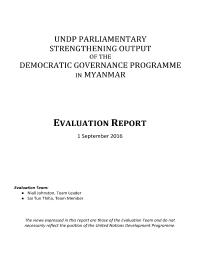
Parliamentary Strengthening Evaluation
Completedon 3 Dec, 2016
Evaluation Plan
Planned End Date
Mar 2016
Evaluation Type
Project
Management Response
Yes
Evaluation Budget
$50,000
Evaluation Title
Parliamentary Strengthening Evaluation
Atlas Project Number
00086608
Plan Period
Status
Completed
Type
Project
Plan Date
1 Mar, 2016
Completion Date
3 Dec, 2016
Budget
$50,000
Expenditure
$50,000
Management Response
Yes
Quality Assessment
Yes
Joint Programme
No
Joint Evaluation
No
GEF Evaluation
No
Countries
Myanmar
Atlas Project Number
00086608
Plan Period
Status
Completed
Type
Project
Management Response
Yes
Plan Date
1 Mar, 2016
Quality Assessment
Yes
Completion Date
3 Dec, 2016
Joint Programme
No
Joint Evaluation
No
Budget
$50,000
GEF Evaluation
No
Expenditure
$50,000
Countries
Myanmar
Output 2.1. Parliaments, constitution making bodies and electoral institutions enabled to perform core functions for improved accountability, participation and representation, including for peaceful transitions
Goal 16. Promote peaceful and inclusive societies for sustainable development, provide access to justice for all and build effective, accountable and inclusive institutions at all levels
16.5 Substantially reduce corruption and bribery in all their forms
16.6 Develop effective, accountable and transparent institutions at all levels
1: Others


